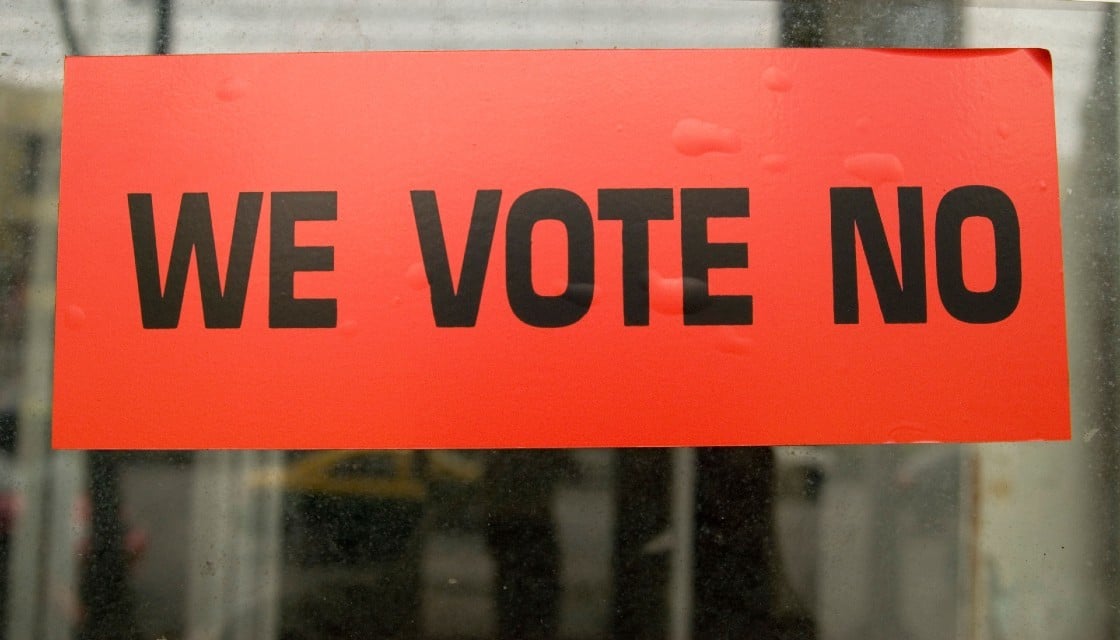A pair of initiatives that would have paved the way for California sports betting were decisively rejected on Election Night.
Both Prop. 26 — which would have legalized retail wagering at California’s tribal casinos and certain horse racing tracks — and Prop. 27 — which would have approved online betting statewide — were taken down by hefty margins Tuesday, dooming sports betting in the largest state in the nation for at least another two years.
According to the California Secretary of State’s office, neither proposition got more than 30% approval, with 95% of precincts partially reporting.
Prop 26: Sports Wagering on Tribal Lands
Prop 27: Online Sports Wagering Outside of Tribal Lands
How the West Was Lost
The question of whether or not to legalize sports betting in California quickly became a hot-button topic among tribal leaders and other interests, with Prop. 27 becoming the most expensive ballot initiative campaign in the state’s history.
Nearly $250 million was spent by tribal entities in the state to block Prop. 27, compared with $169.3 million spent to get it passed, which largely came from FanDuel Sportsbook, DraftKings Sportsbook, BetMGM, and PENN Entertainment.
What Both Sides Say About Their Campaigns
A representative from the “Yes on 27” campaign told BetCalifornia.com in an emailed statement the effort to get online sports betting is far from over, with the failure of Prop. 27 just delaying the inevitable.
The “Yes on 27” representative also noted the loss of funding for mental health and homelessness that would have come from the online sports betting initiative’s passage.
Prop. 27 would have legalized online sports betting while using 85% of all tax revenue to address homelessness and mental health services in California.
“Our coalition knew that passing Prop 27 would be an uphill climb, and we remain committed to California,” the campaign said in a statement. “This campaign has underscored our resolve to see California follow more than half the country in legalizing safe and responsible online sports betting.
“Dozens of states and countless local governments are benefitting from the significant tax revenue that online sports betting provides, and as California faces tax revenue declines and uncertain economic headwinds, online sports betting can provide substantial solutions to fill future budget gaps.”
Kathy Fairbanks, who serves as a spokesperson for the “Yes on 26, No on 27” campaign, said in an emailed statement to BetCalifornia.com the tribal entities’ ability to thwart online wagering was their No. 1 mission.
“Tribes made clear that defeating Prop 27 was always the No. 1 priority, even with tribal-backed Prop 26 on the ballot,” Fairbanks said. “Prop 26 was originally intended for the 2020 ballot, but the pandemic shutdown in March 2020 halted signature gathering, and the measure subsequently qualified for the 2022 election. Once Prop 27 was filed with the California Attorney General in August 2021, tribes’ sole focus shifted to defeating Prop 27. Our campaign spent no money on traditional advertising in support of Prop 26.”
What’s to Come in California
With both 2022 betting propositions defeated, focus now shifts toward the 2024 election cycle — state propositions in California can only be on the ballot during federal election years.
A pair of tribes in the San Manuel Band of Mission Indians and Rincon Band of Luiseno Mission Indians of the Rincon Reservation have already pumped $12.5 million into a 2024 ballot initiative called the California Tribal Government Mobile and Retail Sports Betting Initiative.
The measure would allow the state’s tribes to offer in-person and mobile sports betting, in addition to roulette and dice games.
Whether the online sports betting companies that backed Prop. 27 and the tribal entities that supported Prop. 26 (and ultimately killed Prop. 27) can see eye-to-eye by the time the 2024 election cycle comes around is a matter for another day.
For now, representatives from the “Yes on 27” camp see some combination of mobile and retail sports betting as the best option in order to combat the millions of dollars that flee the state each year to offshore sportsbooks.
“Our campaign also demonstrated how the safe and legal online sports betting market in California can provide significant revenue and benefits to California Tribes — both gaming and non-gaming alike,” the representative told BetCalifornia.com. “Californians are currently placing billions in bets each year on illicit offshore sport betting websites — unsafe and unregulated enterprises that offer no protections for minors or consumers and generate no support for state priorities.
“Californians deserve the benefits of a safe, responsible, regulated, and taxed online sports betting market, and we are resolved to bringing it to fruition here.”
If that does come to fruition, it could potentially open the door for California online casinos down the line as well.






